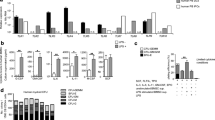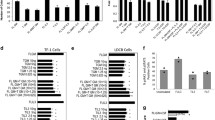Abstract
Macrophage-stimulating protein (MSP), originally identified as an inducer of murine resident macrophage responsiveness to chemoattractants, is a ligand for human RON/murine STK receptor protein tyrosine kinases. Since STK was cloned from populations enriched for hematopoietic stem cells, we initiated studies on the effects of MSP on colony formation by granulocyte-macrophage (CFU-GM), erythroid (BFU-E), and multipotential (CFU-GEMM) myeloid progenitor cells. MSP alone had no colony stimulating activity. However, MSP caused about a 50% suppression of CFU-GM colony formation induced by synergistic combinations of SLF or Flt-L plus GM-CSF, G-CSF, or IL-3 and of BFU-E and CFU-GEMM colonies induced by SLF or Flt3-L plus Epo or Epo and IL-3. In contrast, MSP had no effect on progenitors stimulated by one growth factor. MSP also suppressed colony formation by stimulated cord blood progenitors, but only after preinduction to a rapidly cycling state. It was previously reported that several members of the chemokine family synergistically suppress myeloid progenitor proliferation. Likewise, synergistic suppression was observed when MSP was paired with VEGF, MIP-1α, IL-8, PF4, MCP-1, IP-10, or ENA-78, or when VEGF was paired with the chemokines; and the required MSP concentration was more than 100-fold less than for MSP alone. Additionally, MSP or VEGF inhibited proliferation of the human myeloid growth factor-dependent cell line, M07e, but a sustained effect required multiple additions over time. At the least, some of the MSP suppressive effects on myeloid progenitors, as assessed on single isolated CD34+++ marrow cells, appeared to be directly on the progenitors; sustained additions of MSP were required to see this effect. The suppressive action of MSP and its synergism with proteins of the chemokine family may be of relevance to regulation of blood cell production.
Similar content being viewed by others
Author information
Authors and Affiliations
Additional information
Received: 8 February 1996 / Accepted: 15 February 1996
Rights and permissions
About this article
Cite this article
Broxmeyer, H., Cooper, S., Li, ZH. et al. Macrophage-stimulating protein, a ligand for the RON receptor protein tyrosine kinase, suppresses myeloid progenitor cell proliferation and synergizes with vascular endothelial cell growth factor and members of the chemokine family. Ann Hematol 73, 1–9 (1996). https://doi.org/10.1007/s002770050192
Issue Date:
DOI: https://doi.org/10.1007/s002770050192




